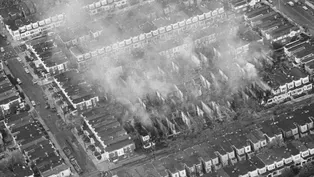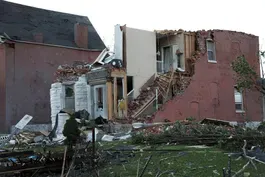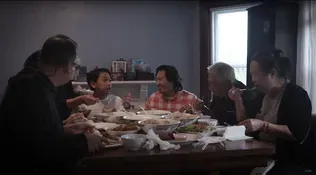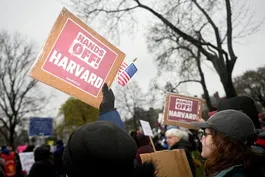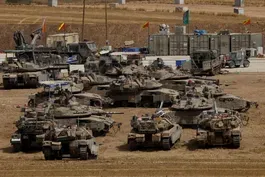
May 17, 2025 - PBS News Weekend full episode
5/17/2025 | 26m 45sVideo has Closed Captions
May 17, 2025 - PBS News Weekend full episode
May 17, 2025 - PBS News Weekend full episode
Problems with Closed Captions? Closed Captioning Feedback
Problems with Closed Captions? Closed Captioning Feedback
Major corporate funding for the PBS News Hour is provided by BDO, BNSF, Consumer Cellular, American Cruise Lines, and Raymond James. Funding for the PBS NewsHour Weekend is provided by...

May 17, 2025 - PBS News Weekend full episode
5/17/2025 | 26m 45sVideo has Closed Captions
May 17, 2025 - PBS News Weekend full episode
Problems with Closed Captions? Closed Captioning Feedback
How to Watch PBS News Hour
PBS News Hour is available to stream on pbs.org and the free PBS App, available on iPhone, Apple TV, Android TV, Android smartphones, Amazon Fire TV, Amazon Fire Tablet, Roku, Samsung Smart TV, and Vizio.
Providing Support for PBS.org
Learn Moreabout PBS online sponsorshipJOHN YANG: Tonight on PBS News Weekend, Israel mobilizes forces for a new ground offensive in Gaza, capping one of the deadliest weeks since the ceasefire collapsed.
Then, how Trump administration cuts to federal grants may affect groundbreaking breast cancer research and a largely forgotten tragedy from 40 years ago this week when police bombed a home in Philadelphia.
MAN: I've never heard of another case where a government has dropped a bomb on citizens in America.
This is not something that you can repair back to normal.
(BREAK) JOHN YANG: Good evening.
I'm John Yang.
The Israeli military says it's mobilizing forces for a new ground assault in Gaza after Palestinian officials said about 300 people died in waves of airstrikes over the past 72 hours.
Officials say the objective of the new offensive, dubbed Operation Gideon's Chariots, is to pressure Hamas into freeing the remaining hostages held in Gaza.
Even with the mounting fighting and preparations for more cease fire talks resume today in Qatar.
Jerry Shih is the Washington Post Jerusalem bureau chief.
Jerry, this operation was approved earlier this month by the Israeli Cabinet.
Any sense of why the delay or the distance between the approval and then launching it?
JERRY SHIH, Washington Post: Yeah, John, so basically what we've seen is that Israeli Prime Minister Benjamin Netanyahu said from the very beginning when this vote passed on May 4th that he was willing to send a massive military campaign into Gaza.
This is a ground assault that would probably encompass about five divisions, that's 60,000 troops.
And they would go in and they would take gradually increasing amount of area within Gaza and drive hundreds of thousands of Gazans south.
If Hamas were not to release hostages.
Now, that was May 4th.
We've had a couple of weeks passed since then, and essentially what we saw was this threat of this campaign being used as a pressure tactic to force Hamas to come to the table from the Israeli perspective.
Now, just in the last couple of hours today on Saturday, we saw that the two sides were again meeting in Doha in what appeared to be a last ditch effort to see if they could reach a deal that would see about 10 Israeli hostages or a little bit fewer than that release in exchange for a ceasefire of one month or more.
JOHN YANG: And so the military is sort of watching the negotiations, the cease fire negotiations, any sense of how it's going, the ceasefire negotiations?
JERRY SHIH: Well, what I can tell you is that, you know, before President Trump arrived in the Middle East early this week, there was actually quite a bit of optimism that maybe a deal could be struck simply because President Trump, as we all know, is very unpredictable.
He may sort of issue some sort of statement that would pressure Prime Minister Netanyahu to come to the table.
And we saw that Hamas also released as a, quote, unquote, goodwill gesture, an Israeli American dual citizen, Edan Alexander.
What we heard was that essentially as of Thursday and Friday, the talks were completely deadlocked.
Now, we're seeing kind of one last push.
Today, the defense minister, Israel Katz, said that it was precisely because of the threat of this impending massive military operation that forced Hamas to come back to the table earlier today on Saturday.
So we're waiting to see how that goes.
But there's a very high possibility, I would say, that we could see a major escalation in the coming 24 or 48 hours.
JOHN YANG: The Israeli military says the bombing that's been going on in Gaza for the past few days has been in preparation for this offensive.
Here's a mother who was in a tented camp in central Gaza that was hit.
UM FIRAS AL-MANSI (through translator): There is no food or drink.
I am psychologically unwell.
What should we do?
Where can we get food?
Where will the children eat or drink?
The tent was hit.
Even if there were leftover rice, macaroni or anything, it is all gone.
JOHN YANG: Now with the strike, the Israeli cabinet has also agreed to the framework of a plan to have foreign companies deliver aid to Gaza.
Any idea what that's going to look like?
JERRY SHIH: Yeah, John, So that's precisely a very important point to keep in mind, which is that aside from the threat of this imminent military campaign and what has already been an extremely bloody week in Gaza, that I've seen more than 300 people killed in Israeli airstrikes, we're also facing this very quickly deteriorating humanitarian situation.
Now, on March 2, the Israeli government began to enforce essentially a full spectrum blockade of all food, fuel, medical supplies, everything going into the Gaza Strip, because the Israeli government claims that a lot of the aid shipments going in have been diverted by Hamas.
Now, it's been more than 70 days that have passed without a single ounce of food entering the Gaza Strip.
The UN has warned of a very imminent famine setting in within the Strip.
And something needs to happen soon.
JOHN YANG: Jerry Shih of the Washington Post from Jerusalem, thank you very much.
JERRY SHIH: Thank you, John.
JOHN YANG: In tonight's other news, nearly two dozen people are dead after severe storms moved through the Midwest and south.
In Kentucky, 14 people were killed, a number that's expected to go up.
The worst damage appears to be in Laurel County, south of Lexington.
In Indiana, strong winds knocked out power and reduced buildings to Rubble.
And in St. Louis, seven people were killed when a tornado slammed through the area.
Residents say it shook their homes and tore them apart and shredded trees.
JOAN MILLER, St. Louis: The windows flew out from the bedroom.
The entire back of my house, this is my -- was my dressing room.
And you can see straight into the alley.
JOHN YANG: Now, the National Weather Service says the Central Plains states could be in for another round of severe storms tomorrow night.
The Supreme Court said on Friday that the Trump administration cannot deport a group of Venezuelan men it says have ties to a violent gang by using the centuries old Alien Enemies Act.
A 7 to 2 majority said migrants in custody in North Texas and must be given enough time to challenge their deportation orders.
The unsigned opinion said they are entitled to constitutionally adequate notice prior to any removal.
The case goes back to a federal appeals court.
On social media, President Trump posted the result of this decision will let more criminals pour into our country.
This is a bad and dangerous day for America.
In another post, President Trump said he hopes a ceasefire in Ukraine will be the result on Monday with when he has separate phone calls with the leaders of Russia and Ukraine.
This after nine people were killed and seven others injured in a Russian drone attack on a civilian bus in northeastern Ukraine.
The bus had been sent to evacuate residents close to the front lines.
Ukrainian President Volodymyr Zelenskyy accused Russia of deliberately targeting civilians.
And World Pride festivities kicked off Today in Washington, D.C., this year's host community.
The biannual celebration is being held against the backdrop of the Trump administration's moves against the LGBTQ community.
On the National Mall, the American Civil Liberties Union and other groups unveiled a massive collection of quilts.
The panels were handmade by transgender people and their families.
Previous World Pride events have been a boon for the host nation's tourism, but this year several countries, including Germany, Ireland and Denmark, have issued official travel warnings for their citizens who are transgender or non-binary.
Still to come on PBS News Weekend, how the escalating feud between the Trump administration and Harvard could affect medical research and a largely forgotten tragedy that rocked the city of Philadelphia 40 years ago.
(BREAK) JOHN YANG: The Trump administration's feud with major American universities escalated this week.
The federal antisemitism task force notified Harvard that $450 million of the school's research grants are being cut, and that's on top of the $2.2 billion that had previously frozen.
Laura Barron-Lopez spoke with one of the affected researchers, Joan Brugge, the director of Harvard's Ludwig Cancer Center.
LAURA BARRON-LOPEZ: Dr. Brugge, you've been working for years on breast cancer research.
Tell me, what type of research exactly are you doing and the type of progress that you've made?
DR. JOAN BRUGGE, Director, Harvard Ludwig Cancer Center: In my lab, the ultimate goal of our research efforts is to find better ways to detect and destroy cancer in its tracks.
And the breast cancer research project that is funded by a National Cancer Institute grant that is currently frozen specifically aims to identify and profile the earliest precursors or harbingers of breast cancer before these precursors become cancer.
The goal then is to develop methods to detect these early precursors and then design treatments that prevent them from becoming cancer.
LAURA BARRON-LOPEZ: So that means, say if someone had one of those, what's known as a BRCA gene, that you could help stop that in its tracks?
JOAN BRUGGE: Yes, this would allow us to monitor the development of or the expansion of these early precursors.
And even before we had treatments for them, we could be able to tell when they're starting to expand.
And that would be a real cue, that would be the cue for those women to have the prophylactic breast cancer mastectomies.
LAURA BARRON-LOPEZ: How important ultimately are federal grants in the work that you do?
JOAN BRUGGE: I would say federal grants are the most important contributors to our research effort.
There just isn't enough money from foundations or partnerships with companies that, to cover the amount of research that is - - that there's opportunities to pursue with termination of, say, for instance, the grant to our lab.
We would have to -- we'd have to -- we wouldn't have the money to fund salaries for the postdoctoral fellows or trainees and research scientists that are doing the work.
We lose the money necessary to buy supplies for these studies and to pay for the technologies.
And this would severely impede progress towards our goal.
Especially when we're so close, we've actually identified these cells that we think are the earliest precursors of cancer.
We wouldn't be able to develop the methods so that this work would have impact in the community.
I never imagined that there would be across the board cut in research that could have such important implications for the general well-being of the United States.
LAURA BARRON-LOPEZ: If research like yours is ultimately cut off, what effect would it have on everyday Americans and the work that you and others do at Harvard?
JOAN BRUGGE: There would be a really significant delay advancing all of the research findings that we've made to date.
And so this would slow down the development of therapies, depending on how long and how broadly these cuts are applied.
But there are a lot of other consequences.
Like the reduction in research funding would reduce the pipeline of disease impacting discoveries from U.S. academic institutions to pharmaceutical companies that then translate the discoveries into treatments and cures for diseases.
So industry relies on these discoveries.
We would also lose our competitive edge and leadership in the world.
Laboratories in other countries would have a significant competitive edge if the discoveries are made outside the United States.
There's also obviously economic implications not only from the loss of revenue from the treatments, but also from the enormous research income that comes to companies who generate the reagents, supplies and services for academic research.
And a major concern is that we're going to lose our best and brightest scientific investigators, the young trainees, to other countries.
Some people aren't going to want to pursue careers in biomedicine with this uncertainty in research funding.
LAURA BARRON-LOPEZ: Dr. Joan Brugge, thank you for your time.
JOAN BRUGGE: You're welcome.
Thank you.
JOHN YANG: Late this week, the government terminated the grant sustaining Brugge's work.
Harvard searching for alternate funding.
This week marked the 40th anniversary of one of the worst tragedies in the history of Philadelphia.
In May 1985, the city's police department dropped an improvised bomb on a residential home that housed the black revolutionary organization called MOVE.
The bomb in the ensuing fire, killed 11 members of the group, including five children, and destroyed more than 60 nearby homes.
Ali Rogin reports on why so many are still coming to grips with what happened.
MAN: MOVE is a totally revolutionary organization.
ALI ROGIN (voice-over): The complicated story of MOVE begins in the early 1970s.
The organization followed the teachings of their founder, John Africa, who advocated a lifestyle rooted in nature.
All members took Africa's last name and lived communally in West Philadelphia.
MAN: We must fight back.
ALI ROGIN (voice-over): They were known for staging disruptive demonstrations and frequently clashing with authorities, protesting everything from police brutality and war to pet stores and zoos.
TOMMY OLIVER, Director, "40 Years a Prisoner": MOVE is and was an organization that's very much committed to life and all of its forms and whatever that looks like.
ALI ROGIN (voice-over): Tommy Oliver is the director of "40 Years a Prisoner," a 2020 HBO documentary that traces the group's origins.
TOMMY OLIVER: They're committed to eating naturally, to living naturally, to not being reliant on technology.
MIKE AFRICA JR., MOVE Organization: We walked around naked a lot as children.
The organization did not.
They believed in vitamin D from the sun.
They believed in allowing your skin to be tougher and stronger.
ALI ROGIN (voice-over): Mike Africa Jr. S parents were both members of MOVE.
MIKE AFRICA: Yes, it was unorthodox.
And yeah, some things were strange to some people, but for me, that was life.
ALI ROGIN (voice-over): That way of life often put MOVE at odds with local police and their neighbors who accused them of creating unsanitary living conditions.
TOMMY OLIVER: Conditions them trying to live in the way that they wanted to live didn't sit well with a lot of people.
So sometimes the neighbors, sometimes the city.
And it escalated pretty significantly pretty quickly.
ALI ROGIN (voice-over): In 1978, more than a year after the city issued an eviction notice, Philadelphia's then mayor, Frank Rizzo, ordered an attack on MOVE's home.
FRANK RIZZO, Former Philadelphia mayor: They're going to go either easy or hard way.
That can be standing up or laying down.
ALI ROGIN (voice-over): The months long standoff culminated in a shootout.
One police officer was killed and MOVE's home was demolished.
While MOVE maintains that the officer died by friendly fire, nine of its members were convicted and sentenced to up to 100 years in prison, including Mike Africa Jr.'s parents.
MIKE AFRICA: The mayor admitted that he believed my parents were innocent.
He believed that my parents were not in prison for the charge that they were charged with.
MAN: Police are inside MOVE headquarters in West Philadelphia conducting an intensive search for weapons.
ALI ROGIN (voice-over): He says the media's portrayal of MOVE was often exaggerated.
And he says the organization was misunderstood even among many African Americans.
MIKE AFRICA: MOVE members are not the turn the other cheek type people.
And a lot of people felt like pacifism was the answer.
And MOVE members were not pacifistic.
If a cop attacked them, they would fight back.
ALI ROGIN (voice-over): Tommy Oliver says those early confrontations, including that 1978 shootout, are critical to understanding what eventually happened.
TOMMY OLIVER: Seven years later, you had officers and members of the police force who wanted revenge.
ALI ROGIN (voice-over): In May of 1985, Philadelphia Mayor Wilson Good ordered the organization to be removed once again from a home where they were living.
WILSON GOOD, Former Philadelphia Mayor: What we have out there is war.
ALI ROGIN (voice-over): And on May 13, local news stations like WCAU in Philadelphia covered the escalating crisis throughout the day.
Police would fire more than 10,000 rounds of ammunition into MOVE's row house before eventually dropping a bomb on it.
The city's police commissioner at the time, Gregore Sambor, defended his officers that evening.
GREGORE SAMBOR, Police Commissioner: At no time did any police position fire in an offensive posture.
It was purely in a defensive posture.
ALI ROGIN (voice-over): Eleven MOVE members, including five children, were killed.
While no city officials were criminally charged.
A Philadelphia investigative commission later concluded that police actions were clearly excessive and, quote, unconscionable.
MIKE AFRICA: I don't think I'll ever recover or heal from what happened.
ALI ROGIN (voice-over): Mike Africa Jr. Who was six at the time of the bombing, is now working as the legacy director of MOVE.
He's reunited with his parents, who were released from prison in 2018 but remain on parole.
MIKE AFRICA: I've never heard of another case where a government has dropped a bomb on citizens in America.
This is not something that you can repair back to normal.
You have to find other ways to cope, and that's what I've been doing for the last 40 years.
ALI ROGIN (voice-over): In 2020, Philadelphia's City Council formally apologized for what happened, as has former mayor Wilson Good.
But Africa junior Says four decades later he'd like the city to create a permanent memorial to commemorate all that was lost that day.
ALI ROGIN: In your opinion, why do you feel that so few Americans know about the events that took place 40 years ago?
MIKE AFRICA: I think the city of Philadelphia does a really good job of limiting the amount of exposure to what happened.
I also think that MOVE history is a very controversial history that brings up a lot of trauma for a lot of people.
Black people were killed by law enforcement.
And, you know, if you saw what happened to George Floyd, and at a certain point, you're tired of hearing about the people that were getting killed by these police officers.
ALI ROGIN (voice-over): But that doesn't stop Mike Africa Jr. From his mission of making sure the history of MOVE and the tragic event that claimed 11 lives and forgotten.
For PBS News Weekend, I'm Ali Rogin.
JOHN YANG: The Hmong are an ethnic group living primarily in China and Southeast Asia.
There are communities of Hmong migrants across the globe.
For Asian American and Pacific Islander Heritage Month, Isabella Jibilian of Rhode Island PBS Weekly recently spoke with a Hmong family about their history and their journey to America.
WOMAN: It's really good to make it soup.
JOHNNY KUE: Very few times my mom and dad have told me they love me, but I know based on how they show me and based how they feed me.
When they feed you, it's a sign of love.
My name is Johnny Kue, and this is my take on growing up Hmong.
The term Hmong means free man.
I would describe it as an ethnic group.
We don't have our own country.
We have our own language.
Hmong, I guess the best way I can say it is we're not a place.
We are a people.
A lot of Hmong history, you know, they were written in tapestry.
They were sewn in tapestry by our mothers and our grandmothers and our aunts.
To the outsider, looking in, it just looks like tapestry.
But when you really take the time to dissect it, you'll see there's a story being told.
In our culture, we call this the Bandao.
This one in particular explains my family's journey exactly.
My mother and father grew up in Laos, and it was around the time the Vietnam War happened that my father was recruited to join the Vietnam War.
MAN: Laos, the strategic key to Southeast Asia's richest areas.
JOHNNY KUE: The United States did not know how to navigate the jungles, and because the Hmongs were familiar with the jungles and the terrain, they were sort of like navigators in the jungle.
When my dad was first recruited into the secret army he was about 15 years old.
When the U.S. left the war, they had to fight for their lives.
They were enemies of Laos, and the orders were to kill the Hmong families on site or to put them in reeducation camps.
When my family were in the concentration camp and they were slated for either reeducation or they were slated to be executed, my sister, my oldest sister at the time, she was so skinny that she was able to get her hand untied from the ropes.
And after she got her hand free, she was able to untie my family.
They were able to escape those camps.
They decided to flee Laos.
The only way was to cross the river that was adjacent to Laos in Thailand.
There were soldiers that were guarding the rivers.
My sister at the time, she was probably one years old, she was on my mom's back and she slipped off.
My father just said that if we go back for her, that there's a chance that we all might be dead.
But my mother was able to rescue her and thankfully they were able to get across the river safely.
Eventually they did settle into Thailand, where they stayed for a while until the United States offered them political refuge.
My father was an immigration caseworker, and he would help get a lot of immigrants into Rhode Island.
A lot of the folks coming in did not have a voice, and there was a lot of fear for the refugees coming in for the first time.
My father did a lot of work with community leaders to help ease those fears and to help those early refugee settlers to become a part of the community.
We lived in South Providence, near the West End.
I have a really big family.
Seven siblings.
Four were born in Laosan-Thailand, and three of us were born in the United States.
I am the last of the seven.
I am the baby of the family.
So the Hmong community was always tight knit.
My father told me, if you're traveling somewhere and you're tired and it's late and you have nowhere to stay, find a phone book and you look up the last name Kue and you say, listen, I am so and so's son from Rhode Island.
Is it okay if we stay at your house tonight?
And he said that they would open up their home for you.
And that's just the community that I've been taught.
There was definitely a time in my life where I was trying to suppress, like who I was because I was trying to fit in.
But as I got older, I realized how important my culture was and I realized how important I need to pass this on to my son.
It became evident that, you know, everything done to raise me the right way is because of our Hmong values.
JOHN YANG: And that is PBS News Weekend for this Saturday.
I'm John Yang.
For all of my colleagues, thanks for joining us.
See you tomorrow.
(BREAK) END
The largely forgotten history of Philadelphia’s MOVE bombing
Video has Closed Captions
Clip: 5/17/2025 | 6m 40s | The largely forgotten history of Philadelphia’s police bombing of Black organization MOVE (6m 40s)
News Wrap: Deadly storms rip through Kentucky and Missouri
Video has Closed Captions
Clip: 5/17/2025 | 3m | News Wrap: Deadly storms rip through Kentucky and Missouri (3m)
Tracing one Hmong family’s journey from Laos to Rhode Island
Video has Closed Captions
Clip: 5/17/2025 | 4m 33s | Tracing one Hmong family’s journey from Laos to Rhode Island (4m 33s)
Trump’s escalating feud with Harvard affects cancer research
Video has Closed Captions
Clip: 5/17/2025 | 4m 39s | Trump administration’s escalating feud with Harvard affects breast cancer research (4m 39s)
Why Israel is mobilizing a new ground assault on Gaza
Video has Closed Captions
Clip: 5/17/2025 | 4m 42s | Israel mobilizes new ground assault on Gaza to pressure Hamas into freeing hostages (4m 42s)
Providing Support for PBS.org
Learn Moreabout PBS online sponsorshipSupport for PBS provided by:
Major corporate funding for the PBS News Hour is provided by BDO, BNSF, Consumer Cellular, American Cruise Lines, and Raymond James. Funding for the PBS NewsHour Weekend is provided by...
